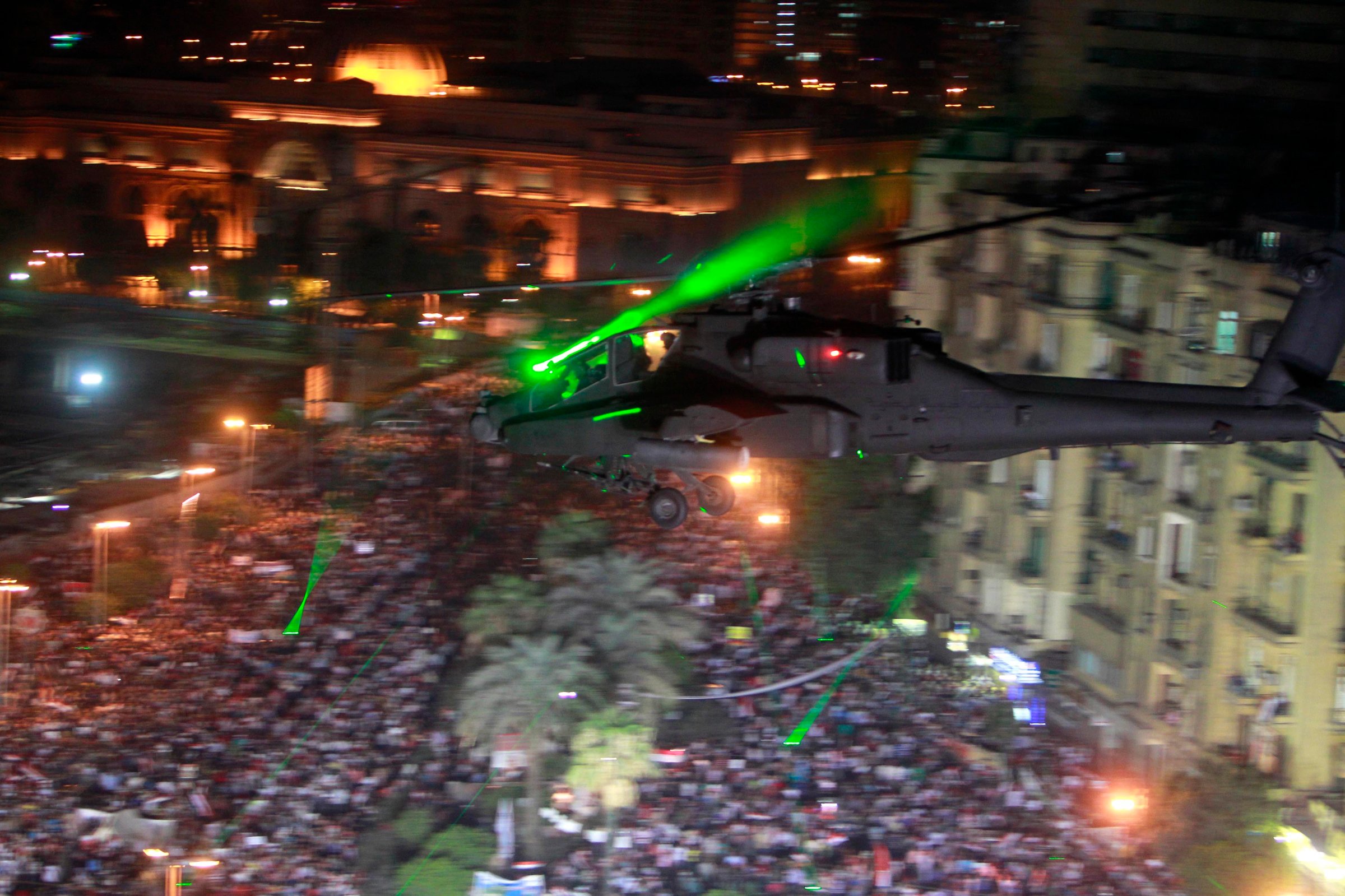
The Pentagon agreed last week to deliver 10 AH-64 Apache helicopter gunships to Egypt. On Monday, an Egyptian judge sentenced 683 people to die for the killing of an Egyptian policeman.
It’s a jarring juxtaposition that highlights the difficulty in nurturing democracy alongside a fight against terrorism. “This is a relationship that, from a military-to-military perspective, that matters,” Rear Admiral John Kirby, the Pentagon spokesman, said Tuesday when asked about the helicopters. “It’s important, and we want to see it continue.”
Not everyone agrees. “I am extremely disturbed by the Egyptian government’s flouting of human rights and appalling abuse of the justice system, which are fundamental to any democracy,” Sen. Patrick Leahy said. The Vermont Democrat oversees such aid from his seat on the Senate Appropriations Committee. “I am not prepared to sign off on the delivery of additional aid for the Egyptian military,” he said, “until we have a better understanding of how the aid would be used, and we see convincing evidence that the government is committed to the rule of law.”
The Apache is one of the deadliest flying guns the world has ever seen. The helicopter’s heart is an M230 chain gun that fires up to 600 eight-inch M789 rounds per minute. It can also launch AGM-114 Hellfire missiles and Hydra 70 rockets from its stubby wings. It’s designed to kill tanks, but works just as well on flesh.
“We believe these new helicopters will help the Egyptian government counter extremists who threaten U.S., Egyptian, and Israeli security,” Kirby said last week. Having concluded that Egypt is complying with the 1979 Camp David accords with Israel, the U.S. is “required” to release some of the $1.3 billion in annual military aid Washington has provided Cairo for three decades. He added that the AH-64s are needed to “support of Egypt’s counterterrorism operations in the Sinai.”
That isn’t what the Administration was saying last fall. “Delivery of these [AH-64s and other weapons] systems could resume pending Egypt’s progress toward and inclusive, democratically elected civilian government,” Derek Chollet, assistant defense secretary for international security affairs, told Congress in October. Barring delivery of the Apaches “is not affecting their operational effectiveness in the Sinai at all,” he added. “They have sufficient capability to take care of that problem.”
Kirby confirmed last week that such progress has not occurred. “We are not yet able to certify that Egypt is taking steps to support a democratic transition, and [Defense Secretary Chuck Hagel] urged the Egyptian government to demonstrate progress on a more inclusive transition that respects the human rights and fundamental freedoms of all Egyptians,” he said.
As if to accentuate that caution, on Monday an Egyptian court sentenced the Muslim Brotherhood’s spiritual leader and 682 others to death for their role in a riot last August that led to the death of a policeman. The Egyptian government has declared the Brotherhood a terrorist organization, a designation the group rejects. While many, if not most, of the death sentences probably won’t be carried out, they act both as a blanket on near-term unrest, and as a pressure cooker for future trouble.
“These sentences ensure the decapitation of the Muslim Brotherhood’s leadership for a generation,” John McCreary, a veteran of the Defense Intelligence Agency, said on his NightWatch blog. “Their severity will have a chilling effect on future demonstrations by any party.” So will a second Egyptian court opinion issued Monday that attempted to shut down the nation’s leading leftist protest group.
The Egyptian judiciary is acting like a vise, squeezing political discourse into a die cast by the country’s military leaders, led by General Abdel Fatah al-Sisi, who is seeking Egypt’s presidency in next month’s election.
The White House was not pleased. “While judicial independence is a vital part of democracy, this verdict cannot be reconciled with Egypt’s obligations under international human rights law,” White House Press Secretary Jay Carney said of the wholesale death penalty. “Egyptian leaders must take a stand against this illogical action and dangerous precedent, recognizing that the repression of peaceful dissent will fuel the instability and radicalization that Egypt says it wishes to prevent.”
Actually, the “dangerous precedent” is the dispatching of helicopter gunships to the coup-plotters who overthrew the elected government of Mohamed Morsi in 2013. Additional troop-carrying UH-60 Black Hawks would have been more than enough to deal with what the U.S. calls the “extremists” in the Sinai. It would have sent an important message, to boot: We’ll help you fight terrorism, but unless you do more to nurture democracy, we can’t trust you with our deadliest flying cannon.
Unfortunately, the difference between the “extremists” feared by Washington, and the “terrorists” feared by Cairo could vanish if Egyptian society explodes like it did in 2011 before the overthrow of Hosni Mubarak, Washington’s longtime autocratic ally. As political repression continues, the Egyptian Apaches could end up being used against the Egyptian people, with Egyptian blood ending up on American hands.
More Must-Reads from TIME
- Donald Trump Is TIME's 2024 Person of the Year
- Why We Chose Trump as Person of the Year
- Is Intermittent Fasting Good or Bad for You?
- The 100 Must-Read Books of 2024
- The 20 Best Christmas TV Episodes
- Column: If Optimism Feels Ridiculous Now, Try Hope
- The Future of Climate Action Is Trade Policy
- Merle Bombardieri Is Helping People Make the Baby Decision
Contact us at letters@time.com